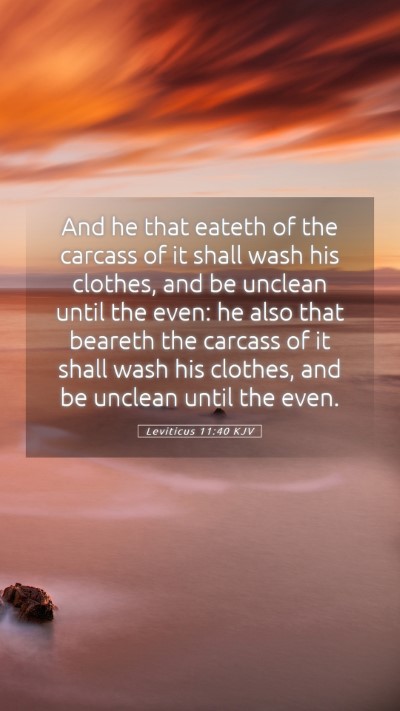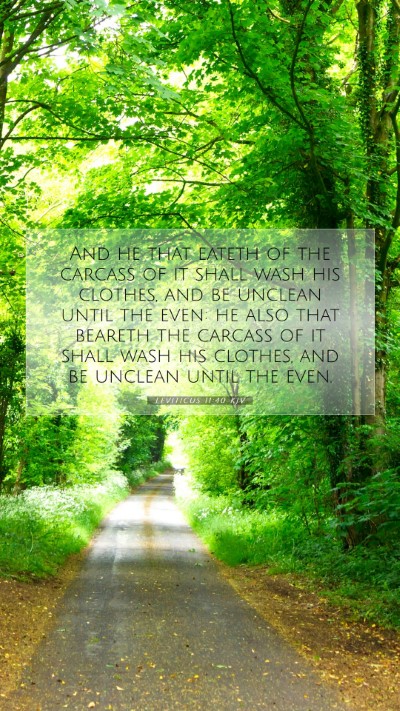Bible Verse Explanation: Leviticus 11:40
The verse Leviticus 11:40 states: "And he that eateth of the carcase of it shall wash his clothes, and be unclean until the even: he also that beareth the carcase of it shall wash his clothes, and be unclean until the even." This scripture, like many others within the context of Leviticus, discusses the Laws of Clean and Unclean.
Overview of Leviticus 11
The chapter outlines dietary restrictions for the Israelites, emphasizing holiness and separation from uncleanness, which serves both a physical and spiritual purpose. In Leviticus 11:40, we see the necessity for purification after contact with certain unclean animals.
Commentary Insights
-
Matthew Henry’s Commentary:
Henry emphasizes the importance of ceremonial cleanliness and the symbolic nature of these laws. He suggests that physical uncleanness reflects a deeper spiritual truth, encouraging believers to maintain purity both outwardly and inwardly. The act of washing clothes signifies a necessary response to uncleanness, which can apply to spiritual contamination as well.
-
Albert Barnes’ Notes:
Barnes points out that this verse serves as a reminder of the sacredness of God's chosen people and the importance of following His commandments. He highlights the fact that the act of eating or touching unclean animals results in a state of uncleanness, calling for a physical act of cleansing, which was significant for the community's health and holiness.
-
Adam Clarke’s Commentary:
Clarke elaborates on the spiritual implications of the law, suggesting that the continual awareness of clean versus unclean is a method through which God teaches His people about His holiness. Clarke notes that while these restrictions may seem legalistic, they serve a higher purpose of fostering a continual awareness of moral and spiritual purity among the Israelites.
Understanding the Context
This commandment illustrates the broader themes in Leviticus related to Israel's identity as a holy nation. God is instructing His people on various cleanliness laws that reflect their covenant relationship with Him. By adhering to these laws, the people demonstrate their obedience and honor to God’s instructions.
Applications for Today
The principles of cleanliness and holiness are relevant today, reminding believers to be vigilant against spiritual contamination. The idea of washing garments serves as a metaphor for repentance and living a life set apart for God.
Bible Study Insights
For those engaged in bible study groups, this verse offers a rich ground for bible study insights and discussion on personal holiness and the significance of law in the life of believers. Utilizing bible study tools—such as cross-references and commentaries—can help deepen the understanding of laws in their historical context and modern application.
Cross References
- Leviticus 7:21: Discusses issues of unclean animals in relation to sacrificial offerings.
- Numbers 19:7-8: Addresses purification rituals associated with uncleanness.
- Isaiah 35:8: Portrays a future where the unclean are welcomed into holiness.
Conclusion
Leviticus 11:40 invites us to consider the significance of physical and spiritual cleanliness. By examining the meaning of Bible verses through a lens of scriptural analysis and biblical exegesis, we gain insights not only into the text itself but also into how it applies to our lives today.


